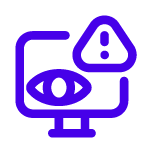
Detailed Analysis
Our AI scanner doesn’t just label entire documents as AI-written. Your detailed report will highlight potentially AI-generated content based on low perplexity. You’ll get a percentage breakdown between the Likely and Highly Likely categories, which makes our AI detection reliable for analyzing significant documents.

Fits Any Type of Work
The perfect tool for both academic and creative writers like a Strikethrough Text Generator. Essays, research papers, short stories, blog posts, articles, business documents — our tool handles it all! Students and educators can use it to meet the highest academic standards, while content creators, copywriters, authors, and publishers can test and improve their text.

Everything In One Place
Enjoying our service? Or maybe the Word Counter. Consider optimizing your experience: eliminate the need to jump between tools for basic functions. You can run your writing through AI detection or scan it for plagiarism right in the editor, and benefit from other built-in text management AI tools like the paraphrasing feature!
Benefits of Our AI Detector

Wide-Range AI Recognition
Built to spot content in English and Spanish from ChatGPT, GPT-4, Bard, Bing, Claude, Google-Gemini, LLaMa, and new AI models.

Privacy Guaranteed
We at AHelp respect your privacy and never pass user data to third parties. Your writing is safe with us.

Browser Plugins Available
Work across all devices without jumping tools or tabs with our free-to-download Edge and Chrome extensions.

Quick File Upload
Skip copypasting if you wish: we support PDF, DOC, DOCX, RTF, ODT, and TXT file formats for upload.

Advanced Algorithms, Advanced Results
AHelp AI Detector free tool closely examines your text for telltale signs of AI that a human eye might miss: repetitive phrasing, predictable structures, and specific word choices. Scan your uploaded documents and get a detailed report in just a couple of minutes. We will find overused AI words, so you can see how different sentences contribute to overall results. Get up to 3 free uses per day and test out the fit before you commit. Access online anytime, operate the text with ease, and keep track of your documents!
How Does Our AI Content Detector Work?




Protect Academic Integrity With Our AI Detection Tool
To keep AI technology around as a freely accessible working assistant in the future, it's necessary to maintain honesty now. AHelp free AI Detector will help you write genuine and original works. For learners and educators, it’s equally important to confirm that the content they handle is correctly cited. Even if problematic areas are flagged in your writing, you can remain authentic. The conversation in educational circles is gradually turning towards the acceptable use of AI for supplemental tasks when properly disclosed, so consult your institution and cite your AI use if applicable.
Enjoying This Tool?
Check out other language versions for the ultimate homework support package!
FAQ
How does our detector identify AI content?
Our detector uses advanced algorithms to analyze text for patterns typical of AI-generated content, such as repetitive phrasing or overly consistent tone. It compares the input against linguistic markers to determine originality and identifies low-perplexity text.
Will our AI Content Detector detect content created using ChatGPT?
Yes, our AI Detector is designed to identify content produced by ChatGPT and similar tools, like Bard, Bing, Claude, and Gemini. It flags text with AI-like characteristics to help users discern between human-written and AI-generated material.
Who will find our AI Detector especially useful?
Writers, students, publishers, bloggers, and educators can all benefit from our AI detector and Bold Text Generator. It’s particularly useful when grading assignments, ensuring originality in content for business and IP-sensitive ventures, and verifying human-authored text for creative or academic writing.
How well does our free AI Detector work?
Our free AI detector provides reliable results by accurately identifying AI-generated content in most cases. While no tool is perfect or 100% accurate, ours sets users up with a quick and clear breakdown, making it a practical solution for everyday needs.
How to get past AI detector?
To get past an academic AI detector, always edit your text so it reads natural. Use AI as a writing assistant, not a replacement for academic effort. Revise AI-generated content by quality-testing it, rephrasing sentences, adding personal insights, and varying sentence structure. This reduces patterns that detectors flag as AI-generated.
Is AHelp AI Detector accurate?
Yes, AHelp’s AI paper detector provides reliable results by analyzing text patterns and linguistic features. It’s designed to distinguish between human-written and AI-generated content, making it a reliable tool for educators, students, and professionals to verify the authenticity of their writing and paperwork, along with our other tools such as Acronym Generator.

 Spanish
Spanish